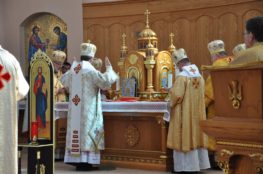There has been so much excellent commentary on the recently concluded meeting between Pope Francis and Patriarch Kirill of Moscow that it seems unnecessary to add too much more to the pile. Clearly an event like this—and the Joint Declaration which emerged from it—wasn’t going to sit the same with all people. Although Eastern Orthodox commentary has been fairly sparse thus far (at least in English), there appears to be a fair amount of discontent floating around traditionalist Orthodox circles (the “pan-heresy of ecumenism” and all that jazz), prompting some to either declare that the sky is falling or, on the opposite end of the spectrum, that neither the meeting nor the Joint Declaration mean a whole heck of a lot. To some extent the latter view is correct. The meeting, in and of itself, won’t amount to a hill of beans unless the Moscow Patriarchate is committed to ongoing theological dialogue and rapprochement. However, as numerous commentators have already highlighted, the Russian state under Vladimir Putin has a definite geopolitical interest in keeping close ties with the Vatican, which may have had more to do with the meeting taking place than any desire to mend the Great Schism.
On the Catholic side of things, I think it is fair to characterize the Ukrainian Greek Catholic Church’s (UGCC) response as less-than-thrilled. (You can find a roundup of commentary here.) Ukrainian Catholic emotions right now range from disappointed to angry, and rightly so. A recent article by Myroslav Marynovych—Vice Rector of the Catholic University in Lviv—sums this up well. An excerpt:
The desire to avoid irritating Moscow has become the starting point for any steps in the Vatican for relations with other churches. For Ukrainian Christians this could be a reason for outrage if not for the fact that, fortunately, the Gospel says nothing about canonical law but quite a lot about truth and the necessary caution that Christians need to exhibit in the face of the evil one. The impression of evil is only amplified when you read paragraph 28, which contains many beautiful and accurate words on the need for cooperation between the Orthodox and the Catholics and about the evangelical basis of this cooperation. However, as soon as one comes across the words about the need ” to testify together to the moral dignity and authentic freedom of the person,” the mind immediately sees the massive violations of human rights in the occupied territories controlled by Russia, which have now become the preserve of the “Russian World.”
The issue is the persecution of the Ukrainian Orthodox Church of the Kyiv Patriarchate and the Ukrainian Greek Catholic Church in Crimea and eastern Ukraine, the physical destruction of Protestant pastors, the arbitrary arrests and “disappearances” of the activists of the Crimean Tatar movement and so on. There is not a single word about all this in the Declaration. It is as if the suffering of the “non-canonicals” and those of other “religious affiliations” are less worthy of compassion than the Christians in Syria.
In the past, Roman popes repeatedly used meetings with political or religious leaders to defend religious freedom and human rights. It is enough to remember the release of Patriarch Yosyf Slipyi from Siberian imprisonment, which we owe to Pope John XXIII, or the legalization of the Ukrainian Greek Catholic Church, which we owe to Pope John Paul II.
Traditional Catholics, who often look down on Orthodox/Catholic get-togethers despite a tendency to fawn over Putin’s Russia, haven’t had too much to say so far. One exception is the popular web-log Unam Sanctam Catholicam where “Boniface” (its pseudonymous author) has written-up the usual menu of traditionalist complaints against Catholics cozying-up to the “schismatic Orthodox.” Unfortunately, the post is a mess, what with its degrading implications concerning the “Uniates” as apparent sub-species Catholics who have been “allowed . . . to retain some degree of cultural distinction in return for their recognition of the supremacy of the Roman Pontiff.” It is exactly this type of Latin-style chauvinism which has made the Orthodox (Eastern and Oriental) leery of drawing closer to Rome in the hopes of reestablishing full communion. Unfortunately, “Boniface”, like too many traditional Catholics, is caught in the mindset that cherry-picking individual converts is the best method for bringing about unity—a mindset that betrays a belief that Latin Catholicism is normative and everything else merely “tolerable.”
But life goes on. The question which should be on everyone’s mind is, “What’s next?” Will we see another meeting between Francis and Kirill in the next year? Does closer ties with the Vatican have any implications for Moscow’s position at the (potentially) upcoming Pan-Orthodox Council? Will the Vatican begin putting pressure on the UGCC to relent from any “bad behavior” which may irk the geopolitical interests of the Russian state and the Moscow Patriarchate? Or might Catholics hope and pray that the Holy Father uses the meeting as a step toward bringing about real healing between Catholics and Orthodox, particularly in Ukraine and Russia, while also protecting the rights of the UGCC? As of right now it is fair to say that Francis has left many Ukrainian Catholics feeling like abandoned stepchildren, but that needn’t be the case. Francis has an opportunity to reach out to Patriarch Sviatoslav and his flock, affirming them in their faith and standing with them in solidarity rather than submitting to political forces. Patriarch Sviatoslav said it best in his statement on the Joint Declaration when he offered up this passage from the Gospel of Luke 22:31: “Simon, Simon! Satan would sift you like wheat, but I prayed for you, so that your faith is not weakened, and when you are converted, strengthen your brethren.”




February 15, 2016
Unfortunately it appears Patriarch Sviatoslav is Cardinal Mindszenty to Francis’s Paul VI. I guess we really are going back to all the bad ideas from the 60’s-70’s including Ostpolitik.
February 15, 2016
Ok, I’m gonna ask cause you’ve hinted around it before in comments about “Uniatism” and I didn’t understand what you meant by this comment:
“Unfortunately, “Boniface”, like too many traditional Catholics, is caught in the mindset that cherry-picking individual converts is the best method for bringing about unity—a mindset that betrays a belief that Latin Catholicism is normative and everything else merely “tolerable.””
To what does “Latin Catholicism” refer? Does that mean those churches in communion with Rome? And how does this apply to Eastern Catholic “Uniatism” which is “corporate” by definition? Or are you saying that traditional Catholics are caught in the mindset that all should be made into TLM worshippers?
Also, is the suggested alternative forbidding individuals to convert to the Catholic Church to encourage total corporate re-union with Orthodox churches?
Or is it simply dropping any positive effort to evangelize the Orthodox to convert to encourage total corporate re-union with Orthodox churches?
And presuming some Orthodox would reject re-establishment of communion, would there be a “minimum” of Orthodox that would need to go along?
Sorry if that’s long, I just wanted to clear some stuff up as to what you were saying.
February 15, 2016
When I refer to Latin Catholicism, I mean the Western Church which is centered in Rome and its attendant disciplines, rites, etc. This would be distinct from Greek Catholicism, which is comprised of the Ukrainian, Ruthenian, Melkite, etc. churches or the other Eastern Catholic churches that come from one or more Middle Eastern traditions.
I do think that traditionalists tend to view everything from a Latin lens with everything else being “merely tolerable” or reduced to an “ethnic custom.” This type of chauvinistic thinking has no place in the Catholic, that is, universal Church, and yet it permeates traditionalist thinking.
If individual Orthodox bishops, priests, and laity wish to join the Catholic Church, then they should be allowed to do that. However, the aim of dialogue with the Orthodox churches should be their full reunion with the Catholic Church in a corporate sense.
“Uniatism” can be a slippery term, and I suppose the “Uniatism” I disagree with is of the political sort, where a political power is swayed into force converting its population. Obviously that’s not much of an option right now. However, that doesn’t mean I am all that high on the Vatican’s behavior and attitude in recent decades, specifically taking a “I’m ok, you’re ok” approach to ecumenical relations with the Orthodox. That to me is a dereliction of duty.
And last, I don’t know if it will ever be possible to do a one-stop-shop agreement with the Orthodox. I think the right approach would be for Rome to find a way to reestablish communion with the individual Orthodox patriarchates and autocephalous churches. Some will obviously resist and defect, but that is on their heads, not Rome’s.
February 16, 2016
GS: “I do think that traditionalists tend to view everything from a Latin lens with everything else being “merely tolerable” or reduced to an “ethnic custom.” This type of chauvinistic thinking has no place in the Catholic, that is, universal Church, and yet it permeates traditionalist thinking.”
I can understand that. I’ve never encountered this myself before (at least not in person), I think a lot of traditional Catholics I’ve met tend to take a “common brethren” approach in preferring a traditional liturgy. And some were former communicants at Eastern parishes. But I have read the “merely tolerable” thinking online for sure. I think it’s part of that whole over-eager yet ignorant phase/tendency that many Traditionalists succumb to. I mean it’s not like these liturgies developed post-Schism or anything… (cf. Anglicanism)
GS: ” “Uniatism” can be a slippery term, and I suppose the “Uniatism” I disagree with is of the political sort, where a political power is swayed into force converting its population.”
Ok, that was my main confusion. I’ve heard “Uniate” used in multiple ways, including just in reference to Easterners in communion with Rome. I read “Boniface” as defining “Uniatism” in a way similar to what you proposed as an alternative, i.e. corporate reception/recognition of non-Catholic Easterners while maintaining/respecting Eastern ecclesiastical traditions/structures. Absent a “merely tolerable” attitude, of course.
After re-reading I didn’t like “Boniface’s” phrasing either, especially since I’ve read his blog in the past and he has cited to Eastern practices approvingly before. But I didn’t catch how it could be offensive till reading it twice.
By the way, I think it’s unfortunate “Uniatism” has gained a pejorative/coercive connotation (like “proselytism”), ’cause I rather like the word to begin with. What’s better than “unity”? Oh well.